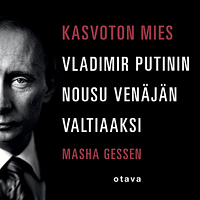Take a photo of a barcode or cover
I'm not quite sure how to rate this book.
Gessen has a major bias. She doesn't agree with Putin's politics and she links everything back to him as the big orchestrator for horrible occurrences that make international news. And, the hardest thing is that, as the title suggests, Putin is a man without a face. Sure, you could link things back to Putin circumstantially, but there will never be any concrete evidence against him. That makes this book difficult. Gessen has amassed so much information about Putin and what he does, yet there is no evidence that can really prove that he had his hand in it.
Luckily, my bias lines up with the author's. I don't like Putin. I never will. I think he's a dictator who has taken over Russia in the guise of democracy. So, as Gessen explains things, I see the lines that connect to Putin and I find them believable, even though there's nothing truly there to set allegations into stone.
Also, the book jumps around a lot. I'm one of those people who has a vague grasp of Russian politics. I was born after the fall of the USSR. I grew up with Russia not being a huge deal. At least, there was no Cold War going on and I wasn't worried about bombs like my parents were. So, when Gessen got into names and people I feel as though I should know, I got confused and twisted about the events.
So, while I think this is a good introductory book on the topic, it helps to have some general grounding in Russian politics and politicians. If anything, it whet my appetite for more on this topic!
Gessen has a major bias. She doesn't agree with Putin's politics and she links everything back to him as the big orchestrator for horrible occurrences that make international news. And, the hardest thing is that, as the title suggests, Putin is a man without a face. Sure, you could link things back to Putin circumstantially, but there will never be any concrete evidence against him. That makes this book difficult. Gessen has amassed so much information about Putin and what he does, yet there is no evidence that can really prove that he had his hand in it.
Luckily, my bias lines up with the author's. I don't like Putin. I never will. I think he's a dictator who has taken over Russia in the guise of democracy. So, as Gessen explains things, I see the lines that connect to Putin and I find them believable, even though there's nothing truly there to set allegations into stone.
Also, the book jumps around a lot. I'm one of those people who has a vague grasp of Russian politics. I was born after the fall of the USSR. I grew up with Russia not being a huge deal. At least, there was no Cold War going on and I wasn't worried about bombs like my parents were. So, when Gessen got into names and people I feel as though I should know, I got confused and twisted about the events.
So, while I think this is a good introductory book on the topic, it helps to have some general grounding in Russian politics and politicians. If anything, it whet my appetite for more on this topic!
Bias in itself isn't necessarily a bad thing;I think the desire for objectivity, even from journalists, is sometimes a misplaced one. It is, in my opinion, foolish to expect Gessen to take a purely aesthetic interest in Putin; to not have her personal feelings come to the fore when talking about a man who persecutes people like her (gay people and dissidents), and who has made her fear for her life and the safety of her family several times. That said, Gessen's particular bias in this book doesn't help us learn anything meaningful about her subject; it doesn't convey much that is interesting (and sometimes obscures it) about her subject (and I do think there is a lot that is interesting about him). She portrays him as both a mediocre leader and strategist, who moved up mostly through luck, and because those who pushed him up believed they would have been able to control him. Yet once he got there, his quick shrugging off of those who had gotten him to the top; his firm grip on power for so long; his capacity to totally annihilate his enemies - including some very powerful oligarchs and political movements - and still retain some semblance of popularity with the (admittedly largely conservative) public; his rebuilding of Russia (whether you consider this a good thing or not) from the struggling drudge that it was under Yeltsin - surely has a more complex explanation than the fact that Gessen believes he's evil? - Because it cannot be explained by his supposed mediocrity. And this is the story Gessen does not explore.
More like a 4.5. There were times I lost the thread regarding the order and reasons behind various contextual events (Masha Gessen is a journalist and not a historian), but it was *hugely* insightful both into how the Russian government came to and currently works and the exact ways in which the U.S. "president" is emulating Putin (to varying degrees of success).
Perhaps the world's most prominent power-oriented politician is President Vladimir Putin of Russia, and The Man Without A Face is Russian writer Masha Gessen's look at how he rose and how he's managed to stay on top. Russian interference with the 2016 presidential election has been and continues to be a very hot topic, so this book got bumped up on my reading list because I wanted some context for what's going on in the world right now. It proved a very timely, very enlightening read.
Those looking for a straightforward biography of Putin will be disappointed. Although the details of Putin's life, such that they are available, are discussed at significant length, the book is just as focused on explaining the Russia in which he came to power and how he's worked to concentrate and hold that power ever since. The relative comfort in which Putin grew up, the disappointment of a boring posting to East Germany while with the KGB, his good fortune in finding himself attached to then-Mayor of St. Petersburg, Anatoly Sobchak, the way in which he was plucked from obscurity to succeed Boris Yeltsin by political handlers overconfident that he would be moldable clay...and his utter ruthlessness in completely destroying potential foes before they were able to gain any real momentum. All of that's there, but Gessen provides important details about Russia's political history to help understand how it was all able to be executed so effectively.
Speaking of executed...Gessen's book doesn't directly accuse Putin of having them carried out, but she draws damning connections between dissident activity that angered him and then sudden, untimely deaths due to very unlikely causes, like radioactive element poisoning. Documentary proof of this and other clandestine, illegal activity very likely doesn't exist or is deeply buried, so she can't present it to her readers. This is not surprising, but I didn't get the sense that she was scare-mongering or making molehills into mountains. It seemed to me like she picked examples of politically motivated scare tactics/violence where the logical chain was clear, and I have to imagine that for every situation she presents, there are several sketchier ones that required larger conclusory leaps that were left untold. If you're interested in Putin, or Russia, or autocrats, I'd definitely recommend this book. It's worth your time.
Those looking for a straightforward biography of Putin will be disappointed. Although the details of Putin's life, such that they are available, are discussed at significant length, the book is just as focused on explaining the Russia in which he came to power and how he's worked to concentrate and hold that power ever since. The relative comfort in which Putin grew up, the disappointment of a boring posting to East Germany while with the KGB, his good fortune in finding himself attached to then-Mayor of St. Petersburg, Anatoly Sobchak, the way in which he was plucked from obscurity to succeed Boris Yeltsin by political handlers overconfident that he would be moldable clay...and his utter ruthlessness in completely destroying potential foes before they were able to gain any real momentum. All of that's there, but Gessen provides important details about Russia's political history to help understand how it was all able to be executed so effectively.
Speaking of executed...Gessen's book doesn't directly accuse Putin of having them carried out, but she draws damning connections between dissident activity that angered him and then sudden, untimely deaths due to very unlikely causes, like radioactive element poisoning. Documentary proof of this and other clandestine, illegal activity very likely doesn't exist or is deeply buried, so she can't present it to her readers. This is not surprising, but I didn't get the sense that she was scare-mongering or making molehills into mountains. It seemed to me like she picked examples of politically motivated scare tactics/violence where the logical chain was clear, and I have to imagine that for every situation she presents, there are several sketchier ones that required larger conclusory leaps that were left untold. If you're interested in Putin, or Russia, or autocrats, I'd definitely recommend this book. It's worth your time.
This was one of the most terrifying books I have ever read, mostly when we hears of tyrannical leaders and the crimes they commit against their own people it is separated by history or in-consequentiality for world events (tragic as they may be). This book is a gripping story that really transforms Putin from the almost joke bond villain he has become on the internet into the real and terrible threat that he is. Masha Gessen has written an incredible work here and I really want to read what else she has done.



